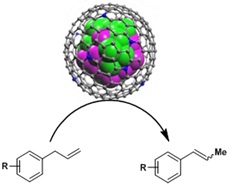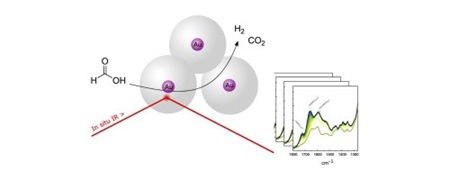Read about our research opportunities...
Design of novel heterogeneous catalysts
In the view of the current environmental challenges there is an urgent need to develop a more sustainable chemical industry. This require more efficient catalytic processes with more active, selective and stable catalysts. A typical approach to improve the catalytic properties is to decrease the size of the active metal nanoparticles. Unfortunately, the decreased size may cause sintering and, consequently, loss of catalytic activity.
The stability may be improved by encapsulation of individual nanoparticles inside porous inorganic material, such as zeolites, oxides, MOF etc. Zeolites are crystalline microporous materials with well-defined structure that are widely applied in industry due to their unique properties with respect to both activity and selectivity. The focus of the research is on development of novel sintering stable heterogeneous nanoparticle catalysts using the advantages of porous materials like zeolites. Furthermore, to improve the selectivity and activity of the catalytic materials by controlling the interplay between the porous materials and the nanoparticles.
However, the catalytic performance of porous materials as zeolites is highly limited by diffusion. Introduction of additional porosity into the zeolites is an efficient way to overcome mass transfer limitations. In the research, new methods to design and generate meso- and microporous materials are also developed.
The overall aim of the research is to develop new catalysts for important chemical processes used in the production of bulk and fine chemicals in the chemical industry.
Application of heterogeneous catalysts in various organic reactions
One of the advantages with heterogeneous catalysis compared to homogeneous catalysis is the easy separation of the products from the catalysts. However, homogeneous catalysis offer excellent selectivity in many organic reactions. Part of the research is therefore aimed at application of heterogeneous catalysts with excellent selectivity in relevant high value organic reactions, both for synthesis of bulk and fine chemicals.
Using this approach, we have recently developed novel catalysts for olefin migration, N-oxide synthesis, and formic acid decomposition etc. The internal alkenes obtained from olefin migration are found in many naturally occurring compounds with pharmaceutical activities. In addition, both internal alkenes and N-oxides are important and valuable chemical intermediates for a number of reactions in organic synthesis and pharmaceutical chemistry. Finally, formic acid decomposition is a safe and convenient source of hydrogen for sustainable chemical synthesis and renewable energy storage.
We also apply physical organic chemistry methods to understand the operating mechanisms of the developed reactions. This knowledge can subsequently guide both catalyst and reaction design.



